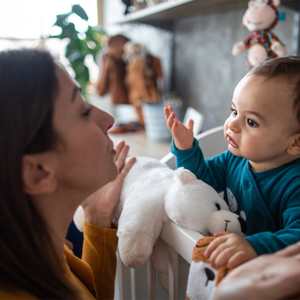How we learn accents before we learn words
No! That's the only word we hear in the latest cute baby video to go viral. But it's not the words that baby Orla says that has made this video so popular. It's the fact that her babbling clearly mimics the distinctive Scouse accent from Liverpool.
This now-famous infant may only have been born in 2022, but the different accents of babbling babies have been investigated for many years. A study from 2009 found that French babies tend to cry with a rising intonation, while German babies' cries often have a falling intonation. Other studies have shown American and French babies reflecting syllables from English and French respectively, and that babies with parents who speak a tonal language, like Mandarin, had a greater range of tones in their crying.
So why does this happen? As children develop, they practise making the sounds of the language that they hear around them. It's natural that they pick up the sounds and rhythms that surround them. In fact, babies start to learn language from their mother from three months before birth. However, it's not just the language of immediate family and caregivers that has an impact. Professor of developmental psychology, Caroline Floccia, highlights studies suggesting that children are more likely to acquire the accent of their environment than that of a parent who has an accent that is foreign to that location.
Why is this important to know? Well, what it shows us is that babies are learning language through practice, and that the more time that parents spend interacting with their children, the greater the opportunity for this there is. While babbling babies may not be able to say many words, studies estimate that they can understand many times the number of words than those that they can actually say. Giving babies exposure to a greater number of words, allows them to better build their vocabulary.
词汇表
go viral ['vaɪrəl] 走红,迅速传播
babbling [ˈbæb(ə)lɪŋ] 牙牙学语,婴儿发出的咿呀声
mimic ['mɪmɪk] 模仿(某人的言行举止)
distinctive [dɪ'stɪŋktɪv] 独特的,与众不同的
Scouse accent [skaʊs] 利物浦口音
Liverpool [ˈlɪvəˌpu:l] 利物浦(英格兰西部港市)
now-famous 如今出名的,声名鹊起的
infant ['ɪnfənt] 婴儿,幼儿
rising / falling intonation [ˌɪntəˈneɪʃ(ə)n] 上升/下降语调
syllable ['sɪləb(ə)l] 音节
respectively [rɪ'spektɪvli] 分别地,各自地
tonal language [ˈtəʊn(ə)l] 声调语言(一种语言类型,其中声调在词汇或语法中起到区分意义的作用)
Mandarin ['mændərɪn] (中国的)普通话,官话,国语
tone [təʊn] 语气,音调,语调
pick up (不费力地) 学会,获得
immediate family 直系亲属
caregiver [ˈkeə(r)ˌɡɪvə(r)] 照料者,看护者
developmental psychology [dɪˌveləpˈment(ə)l] 发展心理学
acquire [əˈkwaɪə(r)] 学到,获得,习得
be foreign to [ˈfɒrən] 与…不同的,对…陌生的
give exposure to [ɪkˈspəʊʒə(r)] 使接触到,使暴露于
📖 翻译、pdf见公众号【琐简】,回复"1"可进【打卡交流群】


BBC随身英语|学说话之前,我们的口音就已经形成了吗?
2分钟 · 1072·
1072· 0
0
 1072
1072 0
0
